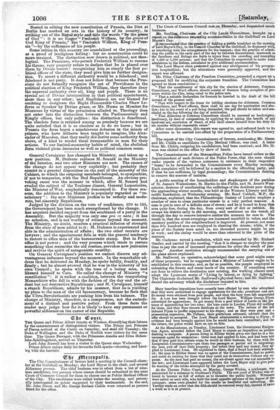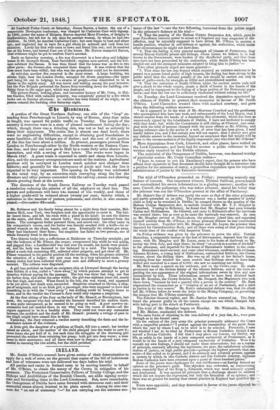Itte ilftetropolis.
The City Commissioners of Sewers held a meeting in the Council-cham- ber at the Guildhall on Monday; the Lord Mayor in the chair, and several Aldermen present. The chief business was to select from a list of nine- teen candidates, two persons whose names should be submitted to the next Court of Common Council for them to choose one as Public Medical Officer of the City. The candidates were called before the meeting, and person- ally interrogated on points suggested by their testimonials. In the end, Mr. John Simon and Mr. George Borlase Childs were returned as persons fitted for the office. The Court of Common Council met on Thursday, and despatched much business.
Mr. Snelling, Chairman of the City Lands Committeee, brought up a report on the reference respecting accommodation in the Guildhall on Lord Mayor's Day. It recommended that the practice of holding a public breakfast on the morning of Lord Mayor's Day, in the Council Chamber of the Guildhall, be dispensed with, as interfering with the arrangements for the banquet; that the practice of admit- ting the public in the early part of the day be likewise discontinued, inasmuch as the furniture and fittings are liable to injury from the crowding and trampling of 1,400 or 1,500 persons; and that the Committee be empowered to make some alterations in the lobbies, calculated to give additional accommodation.
The Lord Mayor elect protested against any abridgment of his prospec- tive hospitalities; but the alterations were generally approved, and the report was affirmed.
Mr. Prior Chairman of the Freedom Committee, presented a report on a proposed bill for modifying the corporate franchise. The Committee had agreed to these resolutions-
' That the constituency of this city for the election of Aldermen, Common Councilmen, and Ward officers, should consist of freemen being occupiers of pre- mises within the City, being rated to the police-rate. " That a suitable declaration for freemen be inserted in the draft of the bill instead of the present oath. " That with respect to the times for holding elections for Aldermen, Common Councilmen' and Ward officers, there shall be one day for nomination and elec- tion; but in the event of a poll being demanded, the poll should be taken and con- cluded on the day following the day of nomination.
"That Aldermen or Common Councilmen should be removed on bankruptcy, insolvency, by deed of composition, by applying for or taking the benefit of any insolvent act, conviction of fraud, or who shall absent himself from his duty for six months without reasonable cause."
After some discussion this report was agreed to, and referred back to its Committee to be carried into effect by the preparation of a Parliamentary bill.
The report of the City Commissioners of Sewers, nominating Mr. Simon and Mr. Childs as candidates for City Medical Officer, was read. A letter from Mr. Childs, resigning his candidature, had been received; and Mr. Si- mon was eledted to the office by show of hands.
The Commissioners of the Metropolitan Police have issued orders to the Superintendent of each division of the Police Force, that the men should make reports of the various nuisances in existence in their respective "beats," to be forwarded to the Commissioners every Monday morning. Each complaint will be followed by a caution to the offending party, and if that be not sufficient, by legal proceedings; the Commissioners desiring to remove the sources of malaria.
A public meeting of the householders and shopkeepers of the parishes of St. James's Westminster, St. Martin-in-the-Fields, and St. Anne's West- minster, desirous of ameliorating the sufferings of the destitute poor during the approaching winter months was held at the Western Literary and Sci- entific Institution, on Wednesday evening. Mr. Bond Cabbell, M.P., the chairman explained, that the Philanthropic Society of London employs a number Of men to clean particular streets in a very perfect manner. A man is put in care of a definite area of street; and he is bound to keep that area quite free, during the day, from every sort of dirt or rubbish. He sweeps his district early in the morning, and continues on the watch all through the day to remove intrusive matter the moment he sees it. The result is, that the street-sweepings are increased manifold in value, and the sanatory position of the neighbourhood is improved. At present, not more than five hundred men are employed in cleaning the streets; while, if the plans of the Society were acted on, ten thousand persons might be put at work; and the outlay would be more than returned in the price of the manure.
Mr. Cochrane moved a resolution, which was seconded by Mr. Richard °fader, and carried by the meeting, "that it is cheaper to employ the poor than to pay the cost of increased prosecutions for crime the result of pau- perism. Another resolution strongly recommended the carrying out of the plans above explained.
Mr. Stallwood, an operative, acknowledged that some good might come of these proposals; but be suggested that a Minister of Labour ought to be established in this country, and, as far as possible, the people employed in colonizing the forests and waste lands of the country. If something were not done to relieve the destitution now existing, the working classes must adopt the Lyonnese motto of "Living by labour, or dying by fighting." The Chairman disclaimed Mr. Stallwood's physical force- and Mr. Stanwood denied the advocacy which the disclaimer imputed to him.
Many heartless impositions have recently been effected by men who advertised that they were authorized to engage apprentices for the sea; premiums and out- fit-money were obtained from poor people, and then the boys were left unprovided for. A case has been brought before the Lord Mayor. William George Flynn advertised for apprentices; he got money from a poor widow of Leeds on the pre tenon of apprenticing her two sons; the boys came to London, Flynn did nothing for them, and they were thrown destitute on the town. The terrors of the law induced Flynn to proffer repayment to his dupes; and as they were poor and a prosecution expensive, Mr. Pelham, their gratuitous advocate, advised that the offer should be accepted. The Lord Mayor administered a warning to Flynn: if evidence had been brought against him he would have been committed; and for the future, the police would have an eye on him.
At the Mansionhouse, on Tuesday, Lieutenant Lean, the Government Emigra- tion Agent, attended before the Lord Mayor to expose an imposition on persons desiring to emigrate. A person living in Billiter Street gives out that he is a Go- vernment agent for emigration: three men had applied to him, and had been told that if they paid him certain sums he would do their business for them with the Emigration Commissioners—get them free passages or partial aid in migrating; the men sold off their little property; but before they paid any money, they ap- plied to Lieutenant Lean. He explained to them, that a fraud had been attempt- ed: the man in Billiter Street was no agent of the Commissioners, had no power, and could do nothing for them that they could not do themselves without any ex- pense. As the men had paid no money, the soi-disant agent was not amenable to the law; and Lieutenant Lean appeared before the Lord Mayor only to give pub- lic warning of the tricks attempted by the party accused. At the Thames Police Court, on Monday, George Wickes, a eowkeeper, was summoned for a nuisance in Goodman's Fields. The cow-yard of Wickes was al- lowed to become so full of ordure as to threaten the public health. Witnesses were called on each side, who held the most opposite opinions of the degree of the nuisance; some even pleaded for the smells as healthful and refreshing. 14r. Yardley made an order that the filth should be removed every day, instead of twice a week as it is at present. At Lambeth Police Court, on Saturday, James Barron, a hatter, the son of a respectable Newington tradesman, was charged by Catherine Carr with bigamy. In 1836, under the name of Malpers, Barron married Mary Flowden, of Sedgley in Staffordshire; but left her in ten days for another woman, by whom he had two children. In 1838, he married Catherine Carr; but soon began to beat and abuse her; and neglected her in tarn for a girl whom he seduced and took from her situation. Lately his first wife came to town and found him out; and he received her at his home, and turned Carr out of the house. Mr. Norton remanded Barron, that evidence might be got to confirm Cares account.
Early on Saturday morning, a fire VMS discovered in a beer-shop and lodging- house in St. George's Street, East Smithfield: engines soon arrived, and the fire- men subdued the flames. It was then found that the house was on fire in two other parts: the firemen also conquered these dangers. It was evident that the fires must have been wilful; but who was the perpetrator could not be discovered.
At mid-day, another fire occurred in the same street- A large building, ten stories high, near the London Docks, occupied for divers purposes,—the upper part being let out in lodgings to a swarm of people,—was discovered to be m flames in the eighth story. All was terror and wailing among the poor inmates; but the Fire Brigade prevented the flames from travelling down the building, con- fining them to the upper part, which was destroyed. The picture-frame, looking-glass, and barometer factory of Mr. Cetta, in Hat- ton Garden, filled with valuable property, was completely gutted by a fire which broke out on Sunday afternoon: no surmise has been formed of it origin, as no peason entered the building after Saturday night.



























 Previous page
Previous page